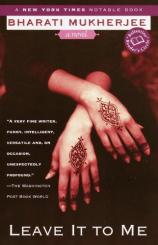Critical Praise
"In Leave It to Me, Mukherjee takes the themes she has previously explored a step further. Destroying the concept of ethnicity altogether, she creates a complex new, transnational definition of self....Devi will know who she is no matter what or whom she has to destroy. But the discovery does not prove to be easy in a region where ethnic boundaries slide over each other like snakes in a basket and many people have discarded the names they were born with....The novel becomes a meditation on the Indian concept of karma and the Greek idea of destiny. "
———San Francisco Chronicle
"Some readers will see in it visionary vengeance on American hubris, a triumph of alien genes, Devi as a force of nature. Yet it also seems to contain a mocking attack on the very notion of speaking for outsiders. Devi suffers from multiple personality disorder--and what's more Western than that?...Devi Dee...merges fearlessly with the human flotsam and jetsam....When she identifies with people she steals their life stories, or at least the bits she wants. She's a psychic scavenger. "
———The New York Times Book Review
"Mukherjee is inspired here in connecting the residues of 1960s culture: the self-described idealists who used civil disobedience as a road to selfish excess; the scarred veterans of Vietnam; and, between them, the damaged children of that generation. She's especially adroit in recalling the Berkeley counterculture and capturing its later expression in the alternative lifestyles and self-serving rationales with which ex-hippies defend their current lives. Her most impressive feat, however, is in rendering her self-destructive heroine with brilliant fidelity to the American vernacular. Profane, brash and amoral, Debby/Devi is not likable, but she is recognizable and true. "
———Publishers Weekly
"This is the Electra story updated. The apocalyptic bloodbaths in which Devi consummates her furious revenge on her parents are every bit as vicious as those that befall the House of Atreus. But Mukherjee's singular achievement is to suffuse them with an almost slapstick, cartoon sensibility that is disturbingly contemporary in its detachment from both reality and morality. "
———New York Daily News
"Everyone keeps inventing themselves, playing roles in which 'movie lines merge with memories.' Who isn't waiting for the call to something more special? "
———Booklist
"Mukherjee combines the journalist's grasp of contemporary culture with the magic realist's appetite for myth....Her book is a hybrid of history and gossip, of high and low culture. "
———The Boston Globe








